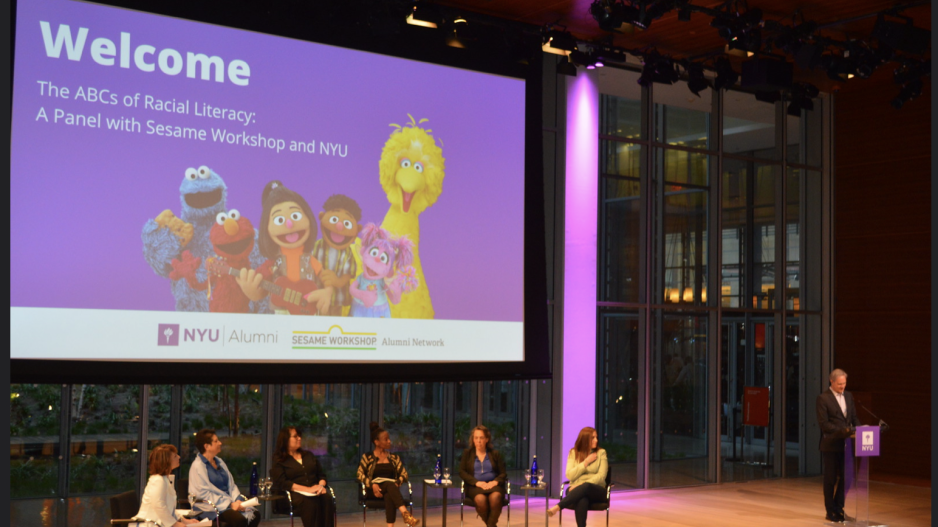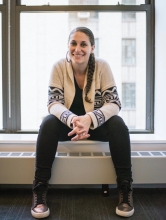At an NYU Alumni event, experts discussed Sesame Street's ABCs of Racial Literacy, a racial justice educational curriculum that helps parents talk to their children about systemic racism and racial identity.
How do children learn about racism in America? And how should parents teach their children respond to violence, discrimination, and stigma? Those were some of the questions that experts from Sesame Workshop and NYU Steinhardt unpacked at The ABCs of Racial Literacy, a special live (and virtual) panel event in April at The Times Center in Manhattan.
Hosted by the Sesame Workshop Alumni Network (SWAN), the NYU Alumni Association, and NYU Steinhardt, the event was moderated by NYU alumna, Cheryl Gotthelf (BA ’78), former Vice President of the Schools Division at Sesame Workshop.

Dean Jack H. Knott Dean of NYU Steinhardt (far right) introduced the panel discussion which featured (from right to left): Cheryl Gotthelf (WSC '78), former VP of Sesame Workshop, Rosemarie Truglio, Senior VP of Sesame Workshop, Akimi Gibson, VP of Sesame Workshop, Makeda Mays Green, VP at Nickelodeon, Professor Diane Hughes (NYU Steinhardt), and Heather Woodley, Clinical Associate Professor (NYU Steinhardt).
Launched in 1969, Sesame Street broke new ground with a diverse cast and a set representing a city setting.
"Sesame is grounded in mutual respect and understanding," said Rosemarie Truglio, Senior Vice President of Curriculum and Content at Sesame Workshop. "The city street is diverse and inclusive, and stands to remind us how important it is for all children to see themselves represented on the screen."
She noted that the series has grown and changed overtime to reflect and respond to societal changes.
One of those changes came during the summer of 2020 and the protests that followed George Floyd's murder. As society grappled with a long history of racism in American, Sesame's producers and creative team recognized they needed to present a broader social justice context for its audience and set out to help children and their families navigate some of the difficult aspects of systemic racism and its continuing effect on communities.
Through a series of town hall specials with CNN, the group brought racism out front and center, creating videos that would build positive racial identity and give preschoolers and their families the language to talk about about anger, outrage, and social justice.
Gotthelf joked that the panel delivered five hours of important information in one hour of discussion. She concluded with important take-aways from the experts:
- It’s never too early to talk about race to children, complete with visuals/books.
- Silence is violence. Not discussing race is as bad as talking badly about others.
- Point out inequities when you see them.
- You don’t need to know everything! Ask questions!
- Your children see your relationships. Have meaningful interactions with people who are different from you.
- Positive accomplishments are just as important to point to as the injustices.
- Materials in your home and what you expose kids to is critical.
- Intentional parenting – you have to decide you want to raise anti-racist kids.
- Pride in one’s racial identity is key.
More materials can be found at Coming Together, a racial justice educational framework created by Sesame Street.

